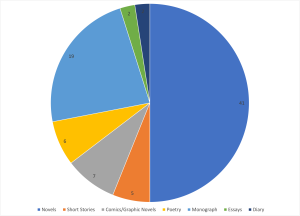I’m a little late in the day this week; we had some morning appointments that had to get done first. Here, though, is some stuff I enjoyed this week:
Album: “Kaytra Todo” by Kaytranada
This album will be available for purchase soon, but you can stream it in full now. It’s some solid instrumental hip hop.
Article: “Does Hollywood Have a Foreign Policy?” by Joshua E. Keating
Keating argues that while many prominent and critically well-received films— Argo, Hotel Rwanda, Black Hawk Down— have presented real, historical events in ways that are highly critical of American power and American foreign policy, they still depict the world outside America as a dark and dangerous place that we would be better off avoiding altogether. I haven’t seen enough of the films mentioned to have any sense of whether this is true, but intuitively it is not surprising; part of the argument for why, for instance, the U.S. and other “Western” powers should not intervene in Africa is often (if only implicitly) about just how different people there are from us, and so will remain unintelligible and dangerous no matter how honorable our intentions.
Photos/Interview: “Abstract Photos of Everyday Household Objects” by Clarissa Bonet/
Clarissa Bonet interviews Nick Albertson about a series of photos using mundane objects from home and office to create abstract images and patterns. There’s some irritating MFA talk here (thinking primarily of his use of the word “indexical”), and I don’t think the idea of forcing viewers to “reconcile the mundaneness of [mass produced] objects with [the] high art aspirations inherent to the modernists” is not particularly new (Duchamp?), but the images themselves are great, ranging from what look almost like pure abstractions to a kind of trompe l’oiel effect using shadows and light (and some of the things Albertson says about light are pretty interesting also).
Article: “Seduced by ‘Perfect’ Pitch: How Auto-Tune Conquered Pop Music” by Lessley Anderson
This is kind of a history of Auto-Tune, but it’s more an attempt to describe and explain its pervasiveness in popular music. It’s much more common than you would think, and used by people you might not expect, because it’s such a difficult temptation to resist: that note you couldn’t quite hit, that weird harmonic kicked up by the guitars and vocals together, that harmony that was just a little off? Gone. Auto-Tune offers the promise of “perfection,” and there aren’t many people who, given a choice about whether to let people hear their mistakes or not, would prefer authenticity to perfection. Anderson touches briefly on the fact that of course everything you hear on a record is mediated by technology, but (I think rightly) moves quickly toward placing Auto-Tune in a different category. She also ends by asking whether people who have grown up entirely in the age of Auto-Tune will be less forgiving of the imperfections that, under the right circumstances, are why lend character and texture to a performance.


